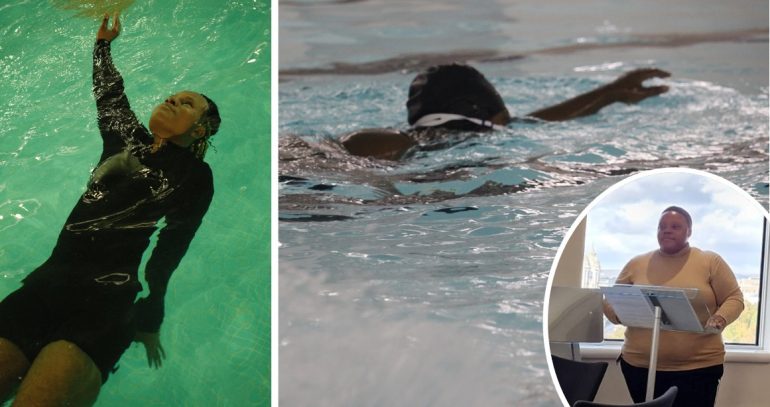The Black Swimming Association Wales has expanded its programme – including a new dads and lads session – to meet a ‘huge’ demand
A GROWING number of people from diverse communities are taking up aquatic activities thanks to initiatives like The Black Swimming Association.
“Within an hour we can give them life-changing advice,” said Steph Makuvise, BSA Wales national programme manager.
The BSA is “supporting diverse communities accessing opportunities to engage with aquatics”.
“It’s really about helping people build a connection with water. We’re essentially the bridge between the aquatic sector and those that aren’t engaged,” said Ms Makuvise.
BSA Wales, which has been running for two years, covers Newport, Cardiff and Swansea and partnered with Sport Wales in 2022. In that time there has been a “huge” appetite for aquatic activities said Ms Makuvise.
The BSA runs free evening sessions at Splott STAR Hub pool as part of their five-week programmes. The sessions are for those looking to increase their water confidence and the goal is to improve safety.
They have recently set up a ‘dads and lads’ session where fathers and sons learn water safety together.
“I’ve been swimming since I was two years old.”
Steph Makuvise, national programme manager, BSA Wales
Ms Makuvise knows from her personal swimming story the importance of water safety. She is from Zimbabwe where she says many families have pools. Her mother taught her and her brother how to swim at a very young age so that they would be safe on play dates at friends’ houses.
The recent growth in people from diverse backgrounds wanting to learn to swim highlights why the work at BSA is important to break down barriers.
Ms Makuvise said representation was one of the main barriers to participation.
The BSA commissioned the Our Swim Story report in which they found that 84% of Black and Asian respondents felt aquatic activity was uncommon in their community.
“People don’t know that that big building 500 metres away from their house is a swimming pool,” said Ms Makuvise.
The BSA runs the Together We Can which is a five-week programme which teaches people with low water confidence how to swim. It is run in collaboration with the Royal National Lifeboat Institution and its main aim is to prevent drownings.
Each session has up to 16 people and starts with a workshop called Blue Hour named after the Golden Hour – the vital hour after a medical emergency where the likelihood of survival is increased if the victim is treated.
Ms Makuvise said that the Blue Hour has the biggest impact of all the sessions that the BSA run: “Within an hour we can give them life changing advice.
“An individual can gain critical information that could save their life, or potentially save the life of someone else.”
- To find out more about the Black Swimming Association, including how to enter a programme, email contactus@thebsa.co.uk



